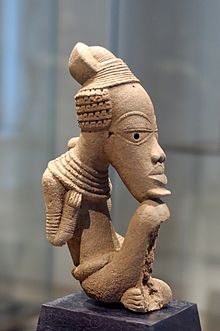Nok culture
Appearance
9°30′N 8°0′E / 9.500°N 8.000°E


The Nok culture was an ancient civilisation in what is now Nigeria. It appeared around 1000 BC and vanished around 300 CE. This civilisation lived in northern and central Nigeria. Its social system is thought to have been very advanced for its time. The Nok are considered to be the earliest producers of life-sized Terracotta sculptures in sub-Saharan Africa. It has been suggested that the Nok culture eventually evolved into the Yoruba.[1][2] The use of iron, in smelting and forging tools, appears in the Nok culture at least by 550 BC and possibly earlier.[3][4][5]
References
[change | change source]Wikimedia Commons has media related to Nok culture.
- ↑ Chambers Encyclopaedia New Revised Edition, vol. 10, p 40, International Learning Systems Corporation Ltd London
- ↑ The New Universal Library, vol. 14, p 456. The Caxton Publishing Company London
- ↑ Jared Diamond, 'Guns, Germs, and Steel: The Fates of Human Societies' (1997) Chapter 19
- ↑ Duncan E. Miller and N.J. Van Der Merwe, 'Early Metal Working in Sub Saharan Africa' Journal of African History 35 (1994) 1-36
- ↑ Minze Stuiver and N.J. Van Der Merwe, 'Radiocarbon Chronology of the Iron Age in Sub-Saharan Africa' Current Anthropology 1968. Tylecote 1975 (see below)
